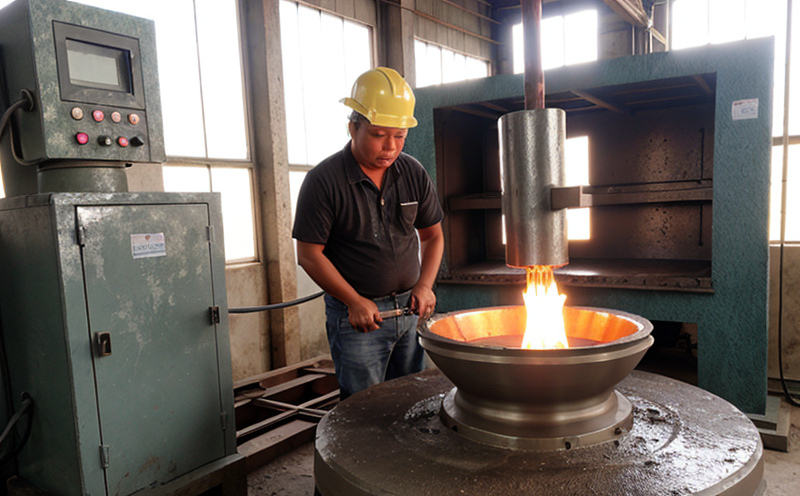ISO 8088 Wear Resistance Testing of Cast Materials
The ISO 8088 standard outlines procedures for wear resistance testing of cast materials, a critical process in the industrial manufacturing and processing sector. This testing is essential for ensuring that cast parts exhibit sufficient durability under abrasive conditions, which is vital for their performance in real-world applications.
Wear resistance is an important property when selecting or validating cast materials for use in environments where friction and abrasion play a significant role. Examples include gears, bearings, and other components subjected to repetitive motion and contact stress. The testing process involves subjecting the sample material to controlled wear conditions under specified loads and speeds.
The test setup typically consists of a rotating disc with a fixed abrasive wheel. Specimens are placed on the rotating disc, which is then rubbed against the stationary wheel for a predetermined duration or distance. Wear rates are measured by comparing initial and final dimensions of the specimens using precision measuring instruments such as micrometers.
The results from this testing provide valuable insights into how well the cast material will perform in operational environments. For instance, higher wear resistance indicates better performance under abrasive conditions, which is crucial for extending component lifespan and reducing maintenance costs.
Compliance with ISO 8088 ensures that materials meet industry standards for reliability and performance. This testing method helps manufacturers maintain consistent quality across production batches, ensuring that the cast parts they produce are robust enough to withstand wear and tear over time.
| Industry Sector | Application Area |
|---|---|
| Mining Equipment | Crushers, conveyors, and grinding mills |
| Railroad Engineering | Wear plates for locomotive components |
| Petrochemical Processing | Valves and pumps subjected to abrasive media |
Why It Matters
The importance of wear resistance testing cannot be overstated, especially in industries where equipment operates under harsh conditions. For instance, in mining, the continuous use of crushing machinery leads to rapid wear and tear, which can result in downtime if not managed properly. Ensuring that cast materials used in these applications meet ISO 8088 standards helps prevent such issues by selecting parts with superior wear resistance.
In railroads, the integrity of components like wear plates is crucial for safe and efficient operations. Any failure could lead to significant disruptions or accidents. By adhering to ISO 8088 guidelines during material selection and testing, railroad engineers can make informed decisions that enhance reliability and safety.
The petrochemical industry also benefits greatly from this type of testing. Equipment handling abrasive substances must be durable enough to maintain performance over extended periods without failure. Compliance with ISO standards ensures that the materials used in these critical systems are up to the task, contributing to overall operational efficiency and environmental protection.
Industry Applications
- Mining Equipment: Crushers, conveyors, and grinding mills
- Railroad Engineering: Wear plates for locomotive components
- Petrochemical Processing: Valves and pumps subjected to abrasive media
Quality and Reliability Assurance
Adhering to ISO 8088 ensures not only that the cast materials meet performance expectations but also that they are consistent across different batches. This consistency is vital for maintaining quality control throughout production runs, ensuring that each part produced meets the required standards.
The testing process itself is designed to replicate real-world conditions as closely as possible. By doing so, it allows manufacturers to identify potential weaknesses in their materials before they enter actual use. This proactive approach helps reduce the risk of failures during operation and extends the service life of components significantly.
Furthermore, compliance with ISO standards enhances a company’s reputation within the industry by demonstrating its commitment to excellence and reliability. It also facilitates easier entry into international markets where regulatory compliance is non-negotiable.





